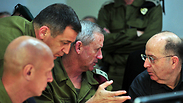
A military operation isn't a PR campaign
Op-ed: Publicity and political commotion distorts IDF's way of action, both in terms of planning and definitely in terms of performance.
The forces stayed in the sea, went back and forth, for more than a week, and returned home safely. Neither then-Prime Minister Yitzhak Shamir, nor the defense and foreign ministers, Yitzhak Rabin and Shimon Peres, nor the chief of staff and his deputy, the Intelligence Directorate head, the Navy commander, and definitely not the Mossad chief, said a word about the matter – not the next day, not the following days and not the following months and years. And it's not that they didn't have anything to tell.
Officially, the State of Israel did not admit to that action to this very day. It's not that the big secret wasn't revealed when IDF soldiers were far out at sea and far from home, but in the international code there is something like "I know you know," and as long as long as there is no public boasting, confirmation and advertising of the operation's execution, the beaten side usually keeps silent. There were cases in which we broke into a public victory dance, and paid a heavy price in blood: See, for example, the car bombs and dozens of casualties in Buenos Aires, Argentina. One side's bragging sometimes drags a harsh response from the other side.
Could we and should we have kept silent following last week's operation? Probably not. The question why we had to run and tell everyone has several answers, topped by the Panamanian flag of the ship and its Turkish sailors. And also, times have changed, and what was appropriate in 1988 is unsuitable these days, when even a visit to the bathroom is accompanied by cameras and regular reports.
Even in the Twitter, Facebook and Instagram era, there are still thousands of operations and actions around the world which are not revealed and will likely never be revealed. Countries, especially those which are in a state of war like Israel, cannot survive even one moment without secrecy.
'We know and can't tell'
So what bothered us in the latest operation? The attack on every camera and microphone, mainly by politicians but not only. There were quite a few among them who want to gain, at any cost, every bit of the dust of fame of the operation. These people, by the way, will always make every effort to wink at anyone they run across that "they know and can't tell." They are the most dangerous ones: They use redundancies and can't wait for the New York Times or the Guardian to expose the big secret, so that they will be able to open their mouths and start talking.
Unfortunately, there have already been leaders who abandoned security-related secrets just for the sake of political capital. This applies to both the Likud and Labor governments. An example from the recent years: For political-personal purposes, they chattered about the strike at the nuclear reactor being built in Syria. The Syrians were smarter. They kept quiet.
The publicity and political commotion distorts the IDF's way of action, both in terms of planning and definitely in terms of performance. A soldier who has to think about how he will be seen on television and how he will be heard on the radio is a bad soldier. A soldier, at any rank, must achieve only one thing: Victory. With all due respect, journalists' comments two days later are not important when one is storming a vessel transporting rockets.
The distortion is even worse when commanders use polished language: "Mr. Chief of Staff, the Navy is honored to serve you with…" I'm willing to put my hand in the fire if the Navy commander used those words when the raid of the ship was completed. It's more likely that he uttered a juicy military curse about the Iranians' mother.
So we have no complaints over the fact that the operation was made public. But taking advantage of the Navy and the IDF thanks to one operation is exaggerated:
The prime minister in a direct message from the United States, the shy defense minister with an announcement for the people of Israel, the chief of staff in a photo from the command pit, the Navy commander in all his glory, the deputy Navy commander in all his splendor, an Operations Branch officer standing high, the Intelligence Directorate head clarifying and explaining.
Excuse me, is there anyone left who has not taken the opportunity yet? Dear friends, an army is not Coca-Cola.










